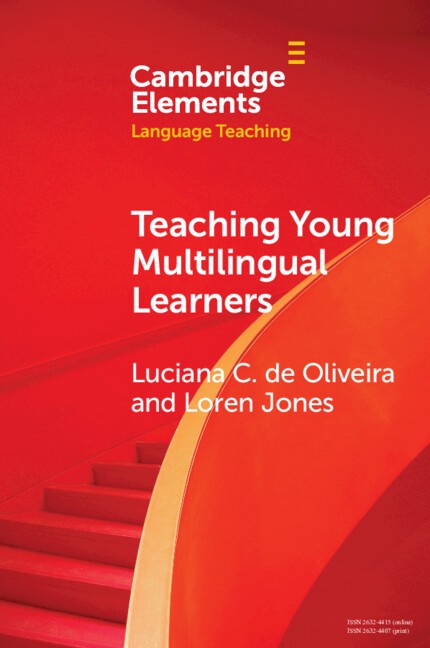Home >
Cambridge Elements in Language Teaching >
Teaching Young Multilingual Learners (Paperback)
Cambridge Elements in Language Teaching
Teaching Young Multilingual Learners (Paperback)
ISBN: 9781108928809
Series: Cambridge Elements in Language Teaching
Teaching Young Multilingual Learners (Paperback)
Cambridge Elements in Language Teaching Teaching Young Multilingual Learners (Paperback) Media > Books > Non-Fiction > Education Books Now available| Order Below |
ISBN
9781108928809 (10-digit ISBN: 1108928803)
- Description
- Series Description
This Element provides an overview of research focusing on language teaching practices for young multilingual learners in primary classrooms in English-speaking contexts. The term 'young multilingual learner' refers to primary school children, with ages ranging from approximately 5 to 12 years old at various English language proficiency levels. Pedagogy-informed research studies conducted in K-5 classrooms are used to develop research-informed pedagogies for young multilingual learners in primary classrooms. The authors use the notion of culturally sustaining teaching practices to provide examples from pedagogy-informed research studies. The focus on early (K-3) and intermediate (4-5) grades provides a range of illustrations of such practices. The Element concludes with implications for teacher education and the preparation of teachers of young multilingual learners.
Language teaching as a field of study straddles the disciplines of education and applied linguistics (and at times other disciplines such as applied psychology and applied sociology). As societies have become increasingly mobile, language teaching practices have changed to keep pace with changing learners’ needs. Globalisation has led to dramatic changes in language pedagogies, both in terms of the rise of global lingua franca such as English, Spanish, Chinese, and Arabic, as well as issues surrounding language teaching in immigrant communities.
As language teaching has developed as a distinct academic field, some scholars have observed a widening gap between researchers and practitioners, accompanied by limited exposure to research by teachers, and a disconnect between professional and academic publications. This elements series aims to close this gap by allying research with language teaching practices, in its exploration of research-informed pedagogy, and pedagogy-informed research. The series builds upon a rich history of pedagogical research in its exploration of new insights within the field of language teaching.
As language teaching has developed as a distinct academic field, some scholars have observed a widening gap between researchers and practitioners, accompanied by limited exposure to research by teachers, and a disconnect between professional and academic publications. This elements series aims to close this gap by allying research with language teaching practices, in its exploration of research-informed pedagogy, and pedagogy-informed research. The series builds upon a rich history of pedagogical research in its exploration of new insights within the field of language teaching.
This Element provides an overview of research focusing on language teaching practices for young multilingual learners in primary classrooms in English-speaking contexts. The term 'young multilingual learner' refers to primary school children, with ages ranging from approximately 5 to 12 years old at various English language proficiency levels. Pedagogy-informed research studies conducted in K-5 classrooms are used to develop research-informed pedagogies for young multilingual learners in primary classrooms. The authors use the notion of culturally sustaining teaching practices to provide examples from pedagogy-informed research studies. The focus on early (K-3) and intermediate (4-5) grades provides a range of illustrations of such practices. The Element concludes with implications for teacher education and the preparation of teachers of young multilingual learners.
As language teaching has developed as a distinct academic field, some scholars have observed a widening gap between researchers and practitioners, accompanied by limited exposure to research by teachers, and a disconnect between professional and academic publications. This elements series aims to close this gap by allying research with language teaching practices, in its exploration of research-informed pedagogy, and pedagogy-informed research. The series builds upon a rich history of pedagogical research in its exploration of new insights within the field of language teaching.
Series Description
Language teaching as a field of study straddles the disciplines of education and applied linguistics (and at times other disciplines such as applied psychology and applied sociology). As societies have become increasingly mobile, language teaching practices have changed to keep pace with changing learners’ needs. Globalisation has led to dramatic changes in language pedagogies, both in terms of the rise of global lingua franca such as English, Spanish, Chinese, and Arabic, as well as issues surrounding language teaching in immigrant communities.As language teaching has developed as a distinct academic field, some scholars have observed a widening gap between researchers and practitioners, accompanied by limited exposure to research by teachers, and a disconnect between professional and academic publications. This elements series aims to close this gap by allying research with language teaching practices, in its exploration of research-informed pedagogy, and pedagogy-informed research. The series builds upon a rich history of pedagogical research in its exploration of new insights within the field of language teaching.
EASY ORDER FORM
PRICES LISTED INCLUDE CONSUMPTION TAX
Price Before Tax:
¥3,630 ¥2,904 ∼ 20% OFF!


